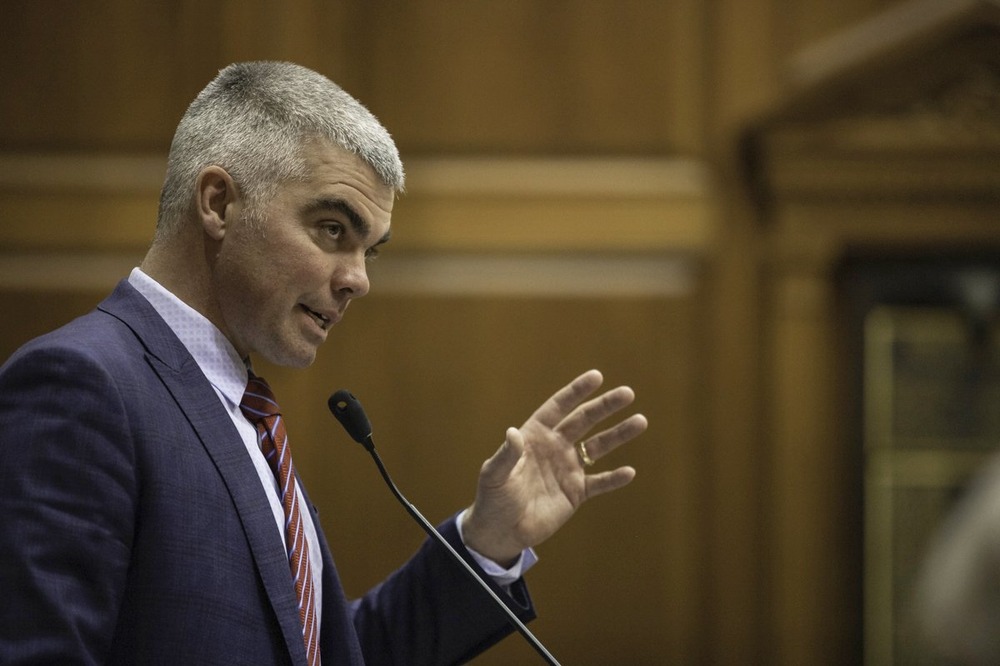
Indiana Rep. Bob Morris, R-Fort Wayne, is pictured in an undated photo. Indiana carried out its first execution since 2009 early on Dec. 18, 2024, and Morris is seeking to repeal the use of capital punishment in the state. (OSV News/courtesy Indiana House Republicans)
Indiana carried out its first execution since 2009 early on Dec. 18, in a process that was criticized as shrouded in secrecy and despite objections from Catholic activists and a pro-life Republican lawmaker seeking to repeal the state's use of capital punishment.
In June, Indiana's Gov. Eric Holcomb and Attorney General Todd Rokita, both Republicans, said they would seek the resumption of executions in Indiana prisons, starting with Joseph Corcoran, who was convicted on four counts of murder and sentenced to death in 1999. The pair cited obtaining the requisite drugs used to carry out executions as behind the decision to resume executions in the state.
Opponents of the Dec. 18 execution of Corcoran said he suffered from mental illness. They unsuccessfully sought to have his sentence commuted to life in prison.
Indiana Rep. Bob Morris, R-Fort Wayne, recently filed legislation to repeal the death penalty in Indiana and had asked Holcomb in a letter to delay the execution at least until the state General Assembly could consider his bill.
Morris told OSV News in an interview Dec. 18 that he was "very disappointed" the execution was carried out. He expressed concern over the impact it would have on Corcoran's relatives and prison staff, especially so close to Christmas.
His legislation, Morris said, would commute existing state death sentences to "a life sentence without the possibility of parole," and ensure that "we no longer have state employees executing prisoners."
As a pro-life legislator, Morris said, he underwent a change of heart on the use of capital punishment. It came as a surprise to some of his fellow Republicans.
"A number of my colleagues were shocked when I gave them a call and said, 'You know, my heart has been changed," he said. "The Holy Spirit is moving me in this direction to repeal capital punishment in the state of Indiana.'"
Asked what his response would be to those who might share his pro-life views on abortion but not the death penalty, Morris replied that sometimes proponents of capital punishment point to Scripture passages they say justifies its use; but he said the context of modern life does not.
"In my mind, the justification is there if society is harmed, or others are harmed," he said. "But does our government in the state of Indiana have to carry it out? And that's really the big question."
Advertisement
Morris also said that he is concerned about Department of Corrections staff who participate in executions.
"We're all on different faith journeys; I don't scold anyone," he said. "I'm just here to educate them and to let people know where I'm at as I continue to pray and, you know, try to find a solution down the road. But those men and women that executed him this morning are having serious psychological effects from what they did. And there's no way anyone can deny that they are, and I know that."
State law prohibited media witnesses from viewing Corcoran's execution, prompting criticism from advocates of press freedom, among other constitutional concerns that judges and other officials ultimately rejected.
"It really bothers me — and I've talked to a number of my colleagues about this — the secrecy that goes into executing a human being. And I really don't feel the state of Indiana needs to continue to do this any longer," Morris said.
Pope Francis revised the Catechism of the Catholic Church in 2018 to reflect that capital punishment is morally "inadmissible" in the modern world and that the church works with determination for its abolishment worldwide.
In a statement shared with OSV News, the Indiana Catholic Conference, representing the five Roman Catholic dioceses in Indiana, said it "commits to advocating for a repeal of the death penalty in the 2025 session of the Indiana General Assembly and to making this among the Conference's top priorities."
A previous letter from the bishops of the Indiana Catholic Conference — Archbishop Charles C. Thompson of Indianapolis, Bishop Kevin C. Rhoades of Fort Wayne-South Bend, Bishop Joseph M. Siegel of Evansville, Bishop Robert J. McClory of Gary, and Bishop Timothy L. Doherty of Lafayette-in-Indiana — reiterated the church's long-standing opposition to the death penalty.
"We are grateful for Indiana's commitment to protecting human life, particularly for the preborn," the July 8, 2024, letter said. "However, the Church holds that human dignity is also offended when the state's punishment takes a life. The convicted, the executioner, and society are all harmed when violence is unnecessarily carried out, especially when the penal system can adequately protect the social order from further harm."







